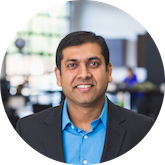Rudy Shankar, Director of Energy Systems Engineering and Institute for Cyber Physical Infrastructure & Energy (I-CPIE) faculty member, is in Phoenix, Arizona this week for Utility Analytics Week 2019. The following are his thoughts from Day 2 of the conference.
Overview
Tuesday, the last day for the Leadership Forum, was structured to listen to ideas from utilities on several topics as listed below. An opening presentation by Bidgely on their business goal to transform “kilowatts to kilobytes” was compelling.

From Kilowatts to Kilobytes (Bidgely)

The customer “experience” has been a catchphrase for modern utilities wanting to assure their product maintained its importance and use. Bidgely, a start-up based in Silicon Valley, is one of many such firms that have revolutionized this concept. From micro-drilling into customer usage patterns and advanced analytics via AI and ML, the company has adopted a Netflix- or Amazon-like experience. They use their deep customer knowledge through penetrating slogans like”.. because you purchased this product, we recommend..” pitch that is not only disarming about its powerful algorithms but also effective in customer retention.
The graphics below show the translation of AMI (automatic meter initiative) data of disaggregating individual appliance usage to potential for providing consumer behavioral profile bond. His closing words “Customer education is easier with data”.
Roundtable Discussions
As a Program Board Member of the Power Shift Committee, I attended and moderated all the morning and afternoon discussions. So the perspectives were from only the Power Shift attendees. They consisted of utility personnel from about 6 utilities and few vendor organizations. The session titles and excerpts of conversations and takeaways are included:
Session 103: Balancing New Technology with Traditional Approaches to Managing the Grid
The proliferation of low-carbon power and DER have created a unique operating environment where supply and demand are substantially more complex than ever before. To manage this complexity, many utilities are looking at new technology and uses of data for more effective operating strategies. However, there are challenges associated with the use of these new technologies—ensuring reliability, losing control over previously manual processes, and employee acceptance. How can utilities identify and execute a balanced approach to minimize risk?
Session 203: Ethical and Safe Democratization of Data for DERs
Many of the opportunities associated with DER are heavily dependent upon data and analytics—defining solutions and services, settlements outside of traditional billing, vehicle-to-grid, etc. However, enabling these capabilities requires visibility of sensitive data, and raises many ethical and security concerns. This session will focus on how utilities can take a more proactive approach to identifying high-risk data and ensuring ethical and safe practices around its use.
Session 303: Forecasting the Low-Carbon Future
Whether it be adoption patterns, intermittency issues, or the formation of new markets, forecasting has become markedly complex. On top of that, day-to-day operations are more reliant than ever upon accurate forecasts to inform grid operations and asset planning. This session will focus on the disruptions occurring within the realm of creating DER adoption, short-term, and long-term forecast models.
Session 403: Educating Allies on the Power Shift
Many utilities have found themselves at odds with customers and regulators when it comes to facilitating the Power Shift; the operating, technical, and business challenges that come hand-in-hand with the integration of clean power and DER are not always well understood by all parties involved. This session will focus on how utilities can educate both customers and regulators.
Joke heard at the meeting...
Concerned Patient: "Should we follow our friends who jump off the bridge?"
Maching Learning: "Yes!"
